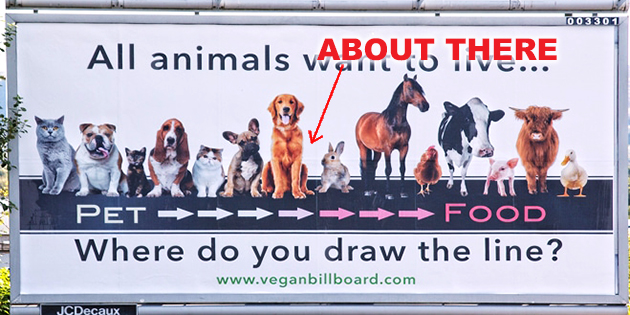
As I discussed in Part One of this post, humans undoubtedly benefit from consuming animal products, including meat. It can be argued that the human benefit outweighs the animal cost.
Many animal activists object to such utilitarian arguments, arguing instead that animals? moral status as ?sentient beings? or ?persons? grants them fundamental rights. But what does it meant to be a ?person?? Or a ?sentient being??
What, exactly, constitutes a ?person? is a question which has vexed philosophy for millennia, from Buddhism to John Locke. For the purposes of animal rights, Canadian philosopher Michael A. Fox characterised a person as one who is critically self-aware, able to manipulate complex concepts, capable of using sophisticated language, and has the capacity to plan, choose and accept responsibility for actions.
While there are challenging objections to this ? for instance regarding incapacitated or immature humans ? Fox?s definition seems a pretty good place to start. No other animal, to the best of our knowledge, fulfills those criteria.
So animals, no matter how much we may love them, are not ?people?. This is important, because ?person? is a forensic concept: it carries moral weight. A person has moral rights ? and also moral responsibilities. If we are not willing to hold an animal morally responsible for their actions as we do a human, they are not a person.
But animal rights defenders argue that, regardless, animal life has inherent value ? equal to a human being ? because they are ?sentient?.
What does that mean? Philosophers generally agree that sentience is the same as what is known as ?phenomenal consciousness?: bluntly, raw experience. To experience and react to one?s environment, to feel. But almost all living things seem to have such phenomenal experiences and reactions, even plants and earthworms. Which would therefore make it difficult for vegans to eat anything at all.
Clearly, we must draw the line somewhere other than mere phenomenal experience.
When activists refer to ?sentience?, I expect, they really mean higher orders of consciousness, such as ?access consciousness?: the ability to ?think about thinking?, introspect, remember past experiences, analyse complex abstractions, and so on. To be aware of ourselves as ourselves.
It is much less clear that animals are ?sentient? in this respect. Most animals do not seem to be aware of themselves as themselves in the same way as humans, as demonstrated by the ?mirror test?: with few exceptions, animals confronted with a mirror seem to react as if they were confronting just another animal. Of course, there are questions about the validity of the mirror test, but it seems at least a good place to start.
Even of the few which do pass the test ? dolphins, some great apes, even a species of magpie ? it still seems difficult to assign them the full moral responsibility that comes with the rights of personhood. Some ant species seem to pass the mirror test: should vegans allow termites to consume their houses unmolested?
Of the animals who don?t pass the test, some still show evidence of higher-order thinking. Dogs seem able to ?think about thinking? when they demonstrate that they are able to consider and act upon the perceived mental state of human companions. Octopuses show often extraordinary abstract, problem-solving thinking.
But no other animal possesses, so far as we know, the full suite of conscious thought as a human being. Despite claims by social media vegans, animals do not have equivalent minds to five-year-old humans. Call it ?species-ist?, but humans are unique. To hold animals morally equivalent to humans is absurd.
The basic untenability of the argument is easily demonstrated with a practical example: the so-called ?liferaft argument?. Five survivors, all of approximately equal size and weight, need to use a liferaft. But the raft can only hold four. One of the five is a dog. Who should be jettisoned? Apart from helpless sentimentalists, even a committed vegan would surely give Fido the quick heave-ho.
Abortion is another counter-argument: the ?sentience? claims easily applies to foetuses. Yet in my experience, vegans do everything to avoid committing to an anti-abortion stance.
But does that mean that animals are merely ours to do with as we wish, even mistreat and torture on a whim? I can hardly imagine even carnivores who would seriously make such an argument.
People have rights, including the right not to be killed and eaten. But the line between ?person? and ?non-person? is hopelessly subjective. If we were to use the common vegan criteria of ?sentience?, we?d be unable to eat anything. Animals, however much we might want them to be, are not people.
Where do I stand on this personally? I eat meat without guilt, although I try to eat less on health grounds. I avoid eating octopus, because I suspect that they may be the closest to a non-human intelligence on Earth. I?d also avoid eating dog and dolphin, although I confess that that?s more an emotional choice. I?d at least try whale and horse.
But those are my personal choices. Vegetarians and vegans are welcome to theirs. What none of us are allowed to do is dictate the choices of others on the basis of poorly thought-out appeals to emotion.

